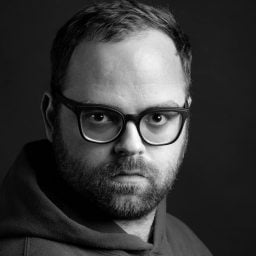Art World
The Artist Who Falsely Claimed Credit for the Utah Monolith Has Opened a Sculpture Park
The Most Famous Artist described the New Mexico venue as “Storm King meets Meow Wolf meets Marfa.”
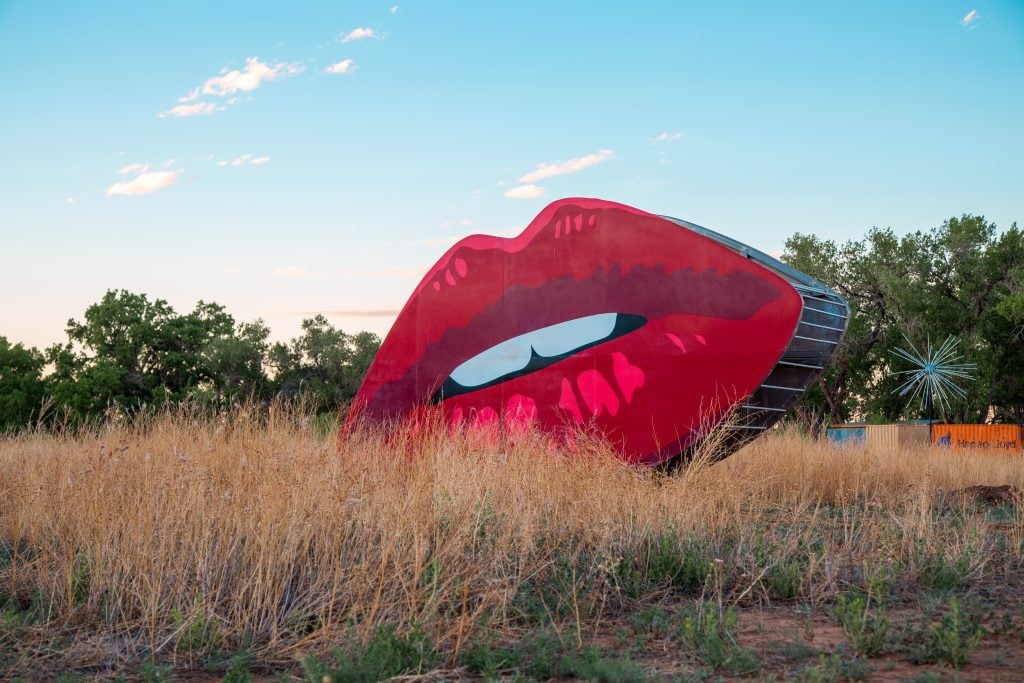
The artist who falsely claimed credit for the silver monolith that appeared in the Utah desert in 2020, which set off a craze of sightings, has opened a sculpture park in New Mexico named Art City.
Matty Mo, known by the pseudonym the Most Famous Artist and generating splashy headlines for art-related stunts, built the 40-acre sculpture park off historic Route 66 near the city of Tucumcari with stunning backdrops of a mesa and the New Mexico desert.
The artist graduated from Stanford University and started his career building tech-y advertising and marketing businesses. Around 2014, he decided he wanted to make art and searched for the phrase “the most famous artist” online. He realized the phrase had been used to reference many artists, but none had taken it as a noun. Soon, his face was appearing with Pablo Picasso and Andy Warhol in Google search results.
“The name preceded my practice and informed my practice—which was around stunts that generated headlines so I could get distribution and new audience,” Mo admitted. That included claiming credit for the mysterious monoliths as a sort of performance art piece.
The way Mo talks about art reflects his background in business. For example, he noted that his early art career began with buying flea market canvases and “upcycling them”—flipping what he bought for $20 and selling it for $1,000, what he called a “really healthy margin.” His website shows works in which he inserts KAWS characters into realist paintings.
In 2020, Mo was living in Los Angeles and his studio was forced to shut down which led him to pause and think about what he wanted to create next. Ditching the flea market canvas appropriations, he also thought about longevity, a project he could work on as an artist for decades without having to chase “the next bit of glory.”
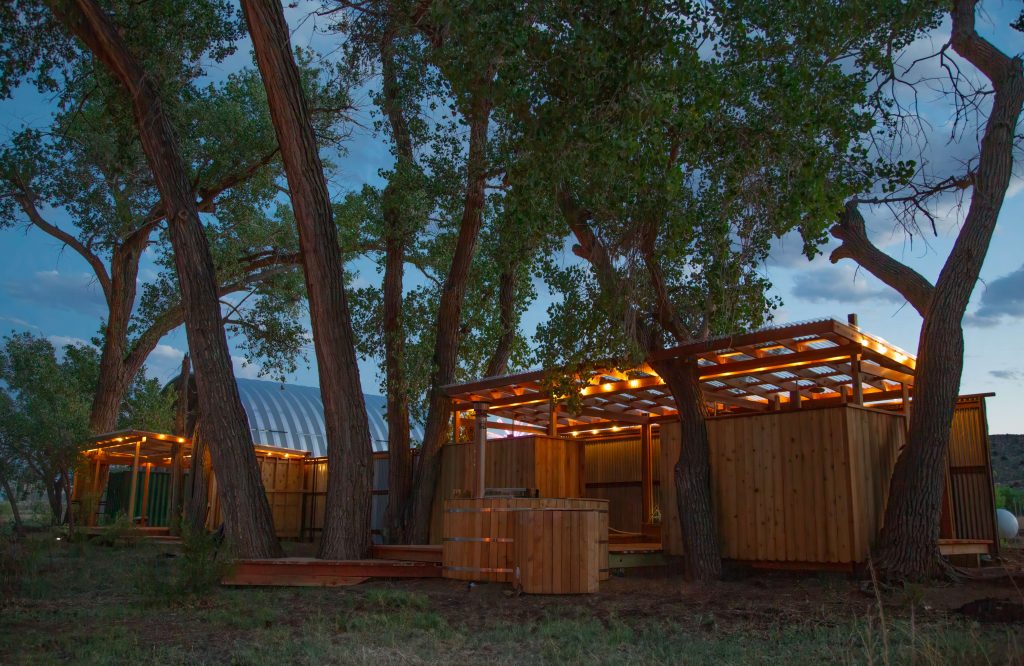
The kitchen and spa area at Art City. Photo courtesy of Art City.
Three years ago, he moved to Tucumcari after drawing a matrix of small towns with conditions he desired for his Art City project. He wanted land two hours from an airport, with great natural resources like water and food on a major thoroughfare.
He described Art City as “Storm King meets Meow Wolf meets Marfa,” referring to the small town in south Texas known for minimalist installations and large-scale works, notably by Donald Judd. The New Mexico site currently has 12 large sculptural works, mostly purchases of previous Burning Man installations. It also offers a camping site, a spa, a communal kitchen, and opportunities for artists-in-residence.
“Ideally, it’s more accessible to the public than Storm King or Marfa and less gimmicky than Meow Wolf,” he said. But he said he didn’t think about any sculpture parks or comparisons that might be made during the planning stage. “You’re not allowed to touch the art at Storm King. At Art City, cruise around have a great time. If I look at Cadillac Ranch, which has like seven cars stuck up into the air with spray cans, a million people a year go to that.”
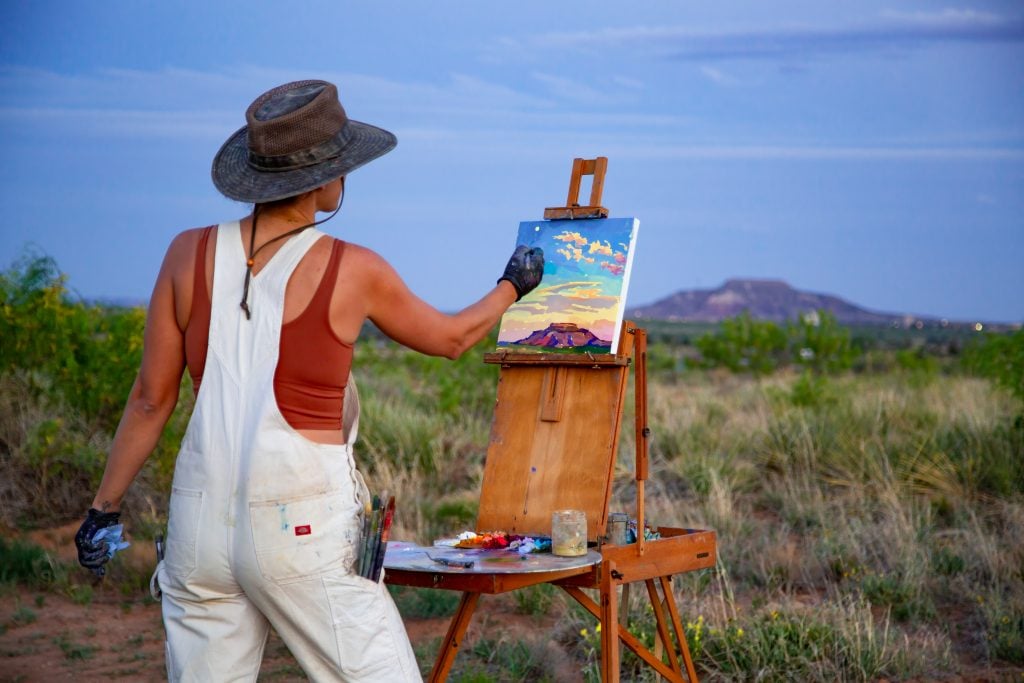
An artist named Rachel painting the mesa near Art City during golden hour. Photo courtesy of Art City.
The company is structured as a for-profit C-Corporation with Mo as the chief executive, built around his desire to ensure there is a 25 percent return on investment on capital invested. He employed Silicon Valley lawyers to help him start the business.
“It has several ways it can make money: daily ticketed visitors, overnight guests, private events, merchandise through the gift shop, and ultimately the sales of these sculptures,” Mo said “I’m unsure what’s going to work best. But I’m optimistic that it will at least be self-sustaining so this can be around for people to enjoy.”
Stating that the art world is filled with white male artists like himself, Mo figured that his role as an artist is to bring Americana to the rest of the country while helping revitalize small towns that “got completely decimated by globalization.”
“Like every Route 66 town is basically the remnants of the ‘80s. There’s all this cool infrastructure, but we haven’t quite figured out how to turn it around,” he said. Like many organizations, he believes the knowledge economy surrounding artists can help. “The hope is that, if there’s a cool bunch of cool art galleries and a sculpture park and a glamping site, and some concerts, people might stick around—and that would have a material impact on the economy of this town. And we can measure that impact.”
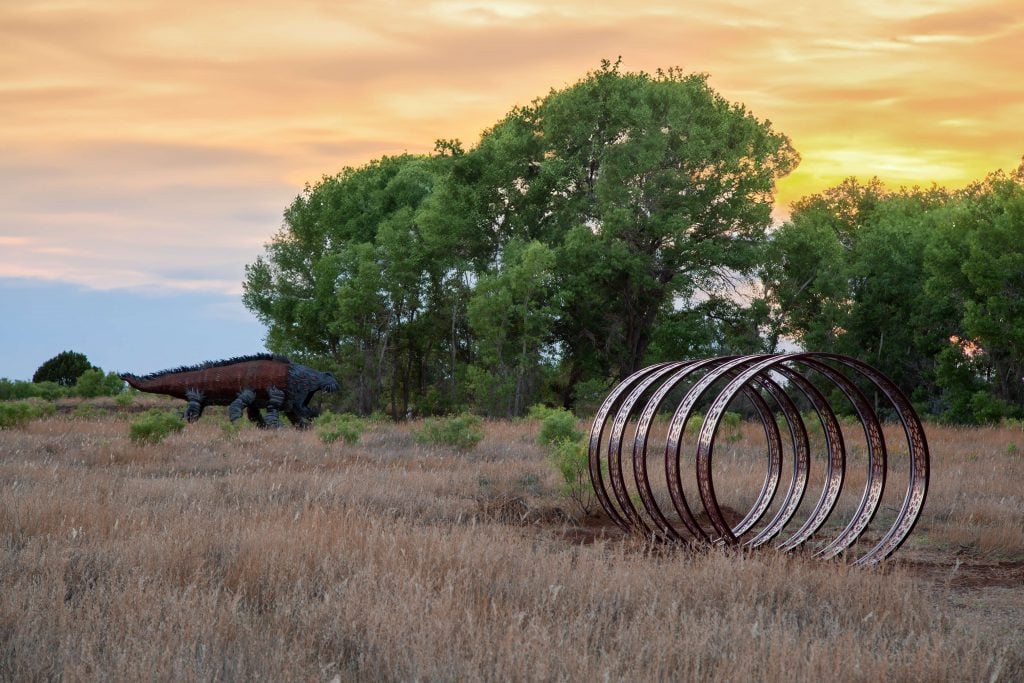
Two sculptures, Centered and Fear Beast, on view at Art City. Photo courtesy of Art City.
Mo is also serving as the patron of artists in the park’s residency program. The artists get to stay on site for free and make work that they install. However, they are not contractually required to. Mo hasn’t entered into contracts with the artists-in-residence other than having them sign an injury liability waiver.
“It’s not your traditional residency where there’s this formal application process. It’s really just for my friends and people that inspire me. Because it’s a business, and I’m the CEO, I get to make those calls,” he said. “I don’t have a board of directors to answer to and that ultimately means that I’m curating a particular aesthetic and a particular class of people.”
Though the majority of the works now installed at Art City are from Burning Man, the festival known for its large-scale sculptures, Mo emphasized he has no affiliation with the project, but is helping the artists sell the works. The pieces from Burning Man he consigned to sell stipulate an 80-20 percent split in favor the artist, saving them from the purgatory of the storage unit. He plans to rotate sculptures that don’t sell on a semiannual basis.
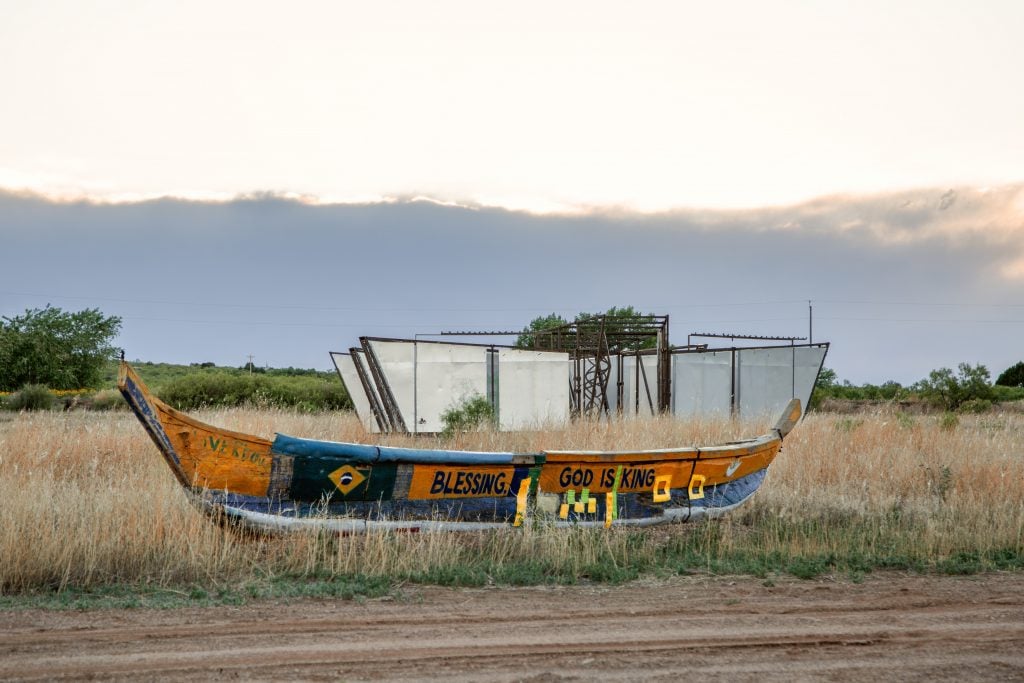
A sculpture titled Bodies Left Behind on view at Art City. Photo courtesy of Art City.
Mo has hopes for Art City to become “a pilgrimage along Route 66.” He shared plans to advertise the site with neon signs based on artificial intelligence renders of the highway touting post-capitalist offerings like “Brenda’s Toe Cleaning Service.”
As for comparisons to Meow Wolf, which has faced internal and external criticism from artists, Mo said he hasn’t had an artist “complain that they weren’t fed, the accommodations weren’t beautiful, and they didn’t have a great time.”
“All the artists here got paid for their travel, their time, their installation. Everyone felt pretty good after it, and that was important to me,” he said. “I could have cut corners and tried to make try to execute this more cash efficiently, but that would have fucked up the vibes. I’m not trying to fuck over any artists.”
Art City is located at 10134 NM-104 in Tucumcari, New Mexico. It is hosting its opening party on June 8. Tickets to visit the site cost $11.11.

